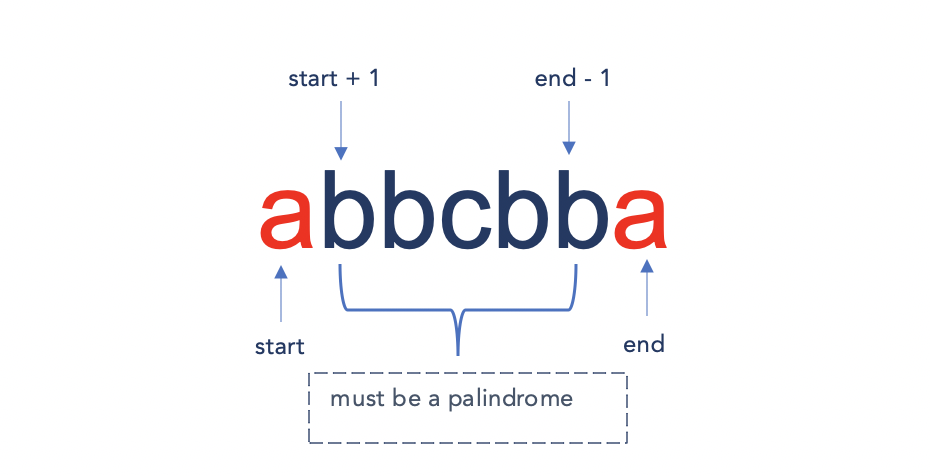Given a string s, partition s such that every substring of the partition is a palindrome.
Return all possible palindrome partitioning of s.
A palindrome string is a string that reads the same backward as forward.
How to Solve
A given string s starting at index start and ending at index end is a palindrome if following conditions are satisfied :
- The characters at
startandendindexes are equal. - The substring starting at index
start+1and ending at indexend−1is a palindrome.

Let N be the length of the string.
To determine if a substring starting at index start and ending at index end is a palindrome or not,
we use a 2 Dimensional array dp of size NxN where,
dp[start][end]=true , if the substring beginning at index start and ending at index end is a palindrome.
Otherwise, dp[start][end] ==false.
Also, we must update the dp array, if we find that the current string is a palindrome.
Test Cases
Example 1:
Input: s = "aab"
Output: [["a","a","b"],["aa","b"]]
Example 2:
Input: s = "a"
Output: [["a"]]
Solution
class Solution {
public:
vector<vector<string>> partition(string s) {
int n = s.length();
vector<vector<string>> result;
vector<vector<bool>> dp(n, vector<bool>(n, false));
vector<string> current;
backtrack(s, dp, 0, current, result);
return result;
}
void backtrack(string s, vector<vector<bool>> &dp, int start, vector<string> ¤t, vector<vector<string>> &result) {
if (start >= s.length()) {
result.push_back(current);
return;
}
for(int pos=start; pos<s.length(); pos++) {
if (s[start] == s[pos] && (pos - start <= 2 || dp[start+1][pos-1])) {
dp[start][pos] = true;
current.push_back(s.substr(start, pos+1-start));
backtrack(s, dp, pos+1, current, result);
current.pop_back();
}
}
}
};class Solution {
public List<List<String>> partition(String s) {
int len = s.length();
boolean[][] dp = new boolean[len][len];
List<List<String>> result = new ArrayList<>();
backtrack(result, s, 0, new ArrayList<>(), dp);
return result;
}
void backtrack(List<List<String>> result, String s, int start, List<String> currentList, boolean[][] dp) {
if (start >= s.length()) result.add(new ArrayList<>(currentList));
for (int end = start; end < s.length(); end++) {
if (s.charAt(start) == s.charAt(end) && (end - start <= 2 || dp[start + 1][end - 1])) {
dp[start][end] = true;
currentList.add(s.substring(start, end + 1));
backtrack(result, s, end + 1, currentList, dp);
currentList.remove(currentList.size() - 1);
}
}
}
}from typing import List
class Solution:
def partition(self, s: str) -> List[List[str]]:
n = len(s)
dp = [[False for _ in range(n)] for _ in range(n)]
res = []
self.backtrack(s, 0, dp, [], res)
return res
def backtrack(self, s, start, dp, current, res):
if start >= len(s):
res.append(list(current))
return
for end in range(start, len(s)):
if s[start] == s[end] and (end-start <= 2 or dp[start+1][end-1]):
dp[start][end] = True;
current.append(s[start:end+1])
self.backtrack(s, end+1, dp, current, res)
current.pop()